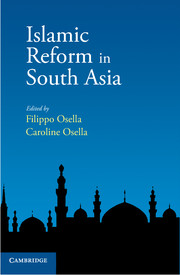Book contents
- Frontmatter
- Contents
- List of Contributors
- Introduction
- Part I Reformist Journeys
- 1 The Equivocal History of a Muslim Reformation
- 2 Islamic Reform and Modernities in South Asia
- 3 Reform Sufism in South Asia
- 4 Breathing in India, c. 1890
- Part II Debating Reform
- Part III Everyday Politics of Reform
- Part IV Reform, State and Market
- Index
3 - Reform Sufism in South Asia
from Part I - Reformist Journeys
Published online by Cambridge University Press: 05 January 2014
- Frontmatter
- Contents
- List of Contributors
- Introduction
- Part I Reformist Journeys
- 1 The Equivocal History of a Muslim Reformation
- 2 Islamic Reform and Modernities in South Asia
- 3 Reform Sufism in South Asia
- 4 Breathing in India, c. 1890
- Part II Debating Reform
- Part III Everyday Politics of Reform
- Part IV Reform, State and Market
- Index
Summary
Introduction
In the Introduction to the hagiography of the reform Naqshbandi Sufi saint, Zindapir, the ‘Living Saint’, who died in his lodge near Kohat, Pakistan, in 1999, poet and devoted khalifa (vicegerent) of Zindapir Rab Nawaz writes:
Contemporary Muslim students (talib) who study in religious schools, the vast portion of their life passes in studying formal [religious] sciences. They remain denied those sciences that allow for the purification of the soul and cleansing of the heart. This is the very reason why the majority of ‘ulama expend their entire efforts in polemical disputation and conflict, and in becoming orators from whom other than sedition and corruption, no positive outcome is attained. In religious seminaries, words remain but meaning is lacking. Traditionally people used to reach meanings through the acquisition of knowledge, from which they attained the recognition of the holy essence (zat) of the Messenger of Allah. For the ‘ulama of today, and in today's madrassahs, this language (baat) is no longer there. Refinement of the soul, ascetic discipline and struggle, contemplation by way of the ‘illuminating lights’, and the highway that is mystical knowledge of the divine essence and attributes, of true principles, are totally ignored.
(Rab Nawaz n.d.: 8)- Type
- Chapter
- Information
- Islamic Reform in South Asia , pp. 51 - 78Publisher: Cambridge University PressPrint publication year: 2013
- 6
- Cited by



